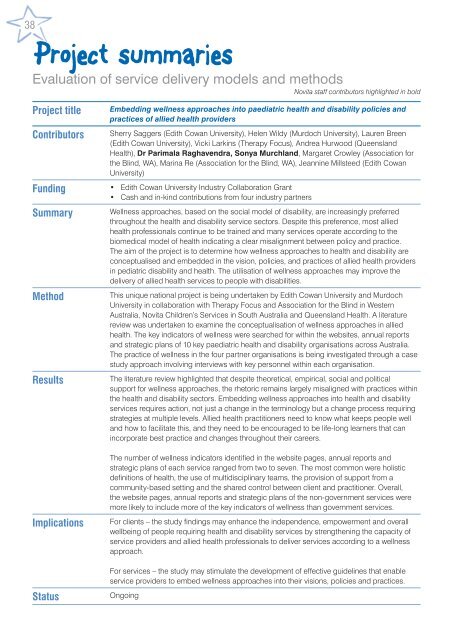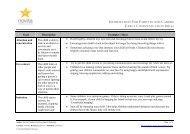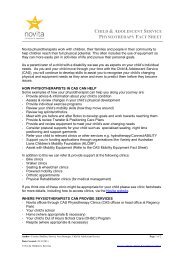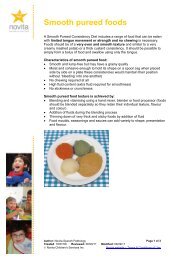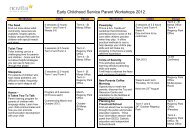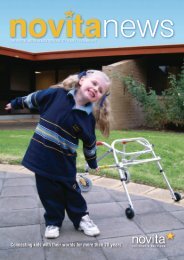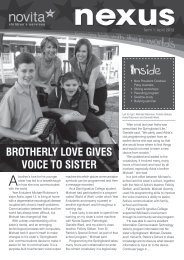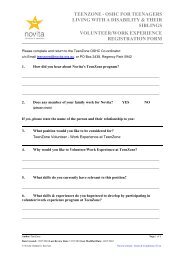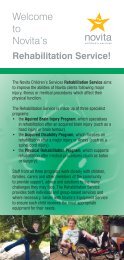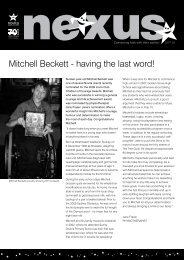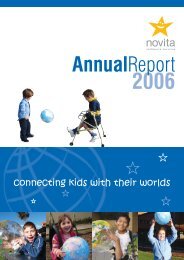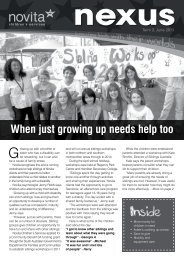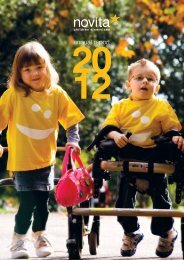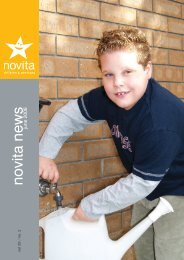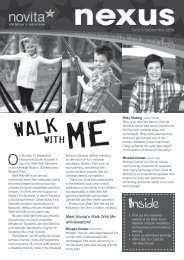Novita Research Report - 2004 to 2007 - Novita Children's Services
Novita Research Report - 2004 to 2007 - Novita Children's Services
Novita Research Report - 2004 to 2007 - Novita Children's Services
- No tags were found...
You also want an ePaper? Increase the reach of your titles
YUMPU automatically turns print PDFs into web optimized ePapers that Google loves.
38Project summariesEvaluation of service delivery models and methods<strong>Novita</strong> staff contribu<strong>to</strong>rs highlighted in boldProject titleContribu<strong>to</strong>rsFundingSummaryMethodResultsImplicationsStatusEmbedding wellness approaches in<strong>to</strong> paediatric health and disability policies andpractices of allied health providersSherry Saggers (Edith Cowan University), Helen Wildy (Murdoch University), Lauren Breen(Edith Cowan University), Vicki Larkins (Therapy Focus), Andrea Hurwood (QueenslandHealth), Dr Parimala Raghavendra, Sonya Murchland, Margaret Crowley (Association forthe Blind, WA), Marina Re (Association for the Blind, WA), Jeannine Millsteed (Edith CowanUniversity)• Edith Cowan University Industry Collaboration Grant• Cash and in-kind contributions from four industry partnersWellness approaches, based on the social model of disability, are increasingly preferredthroughout the health and disability service sec<strong>to</strong>rs. Despite this preference, most alliedhealth professionals continue <strong>to</strong> be trained and many services operate according <strong>to</strong> thebiomedical model of health indicating a clear misalignment between policy and practice.The aim of the project is <strong>to</strong> determine how wellness approaches <strong>to</strong> health and disability areconceptualised and embedded in the vision, policies, and practices of allied health providersin pediatric disability and health. The utilisation of wellness approaches may improve thedelivery of allied health services <strong>to</strong> people with disabilities.This unique national project is being undertaken by Edith Cowan University and MurdochUniversity in collaboration with Therapy Focus and Association for the Blind in WesternAustralia, <strong>Novita</strong> Children’s <strong>Services</strong> in South Australia and Queensland Health. A literaturereview was undertaken <strong>to</strong> examine the conceptualisation of wellness approaches in alliedhealth. The key indica<strong>to</strong>rs of wellness were searched for within the websites, annual reportsand strategic plans of 10 key paediatric health and disability organisations across Australia.The practice of wellness in the four partner organisations is being investigated through a casestudy approach involving interviews with key personnel within each organisation.The literature review highlighted that despite theoretical, empirical, social and politicalsupport for wellness approaches, the rhe<strong>to</strong>ric remains largely misaligned with practices withinthe health and disability sec<strong>to</strong>rs. Embedding wellness approaches in<strong>to</strong> health and disabilityservices requires action, not just a change in the terminology but a change process requiringstrategies at multiple levels. Allied health practitioners need <strong>to</strong> know what keeps people welland how <strong>to</strong> facilitate this, and they need <strong>to</strong> be encouraged <strong>to</strong> be life-long learners that canincorporate best practice and changes throughout their careers.The number of wellness indica<strong>to</strong>rs identified in the website pages, annual reports andstrategic plans of each service ranged from two <strong>to</strong> seven. The most common were holisticdefinitions of health, the use of multidisciplinary teams, the provision of support from acommunity-based setting and the shared control between client and practitioner. Overall,the website pages, annual reports and strategic plans of the non-government services weremore likely <strong>to</strong> include more of the key indica<strong>to</strong>rs of wellness than government services.For clients – the study findings may enhance the independence, empowerment and overallwellbeing of people requiring health and disability services by strengthening the capacity ofservice providers and allied health professionals <strong>to</strong> deliver services according <strong>to</strong> a wellnessapproach.For services – the study may stimulate the development of effective guidelines that enableservice providers <strong>to</strong> embed wellness approaches in<strong>to</strong> their visions, policies and practices.Ongoing


